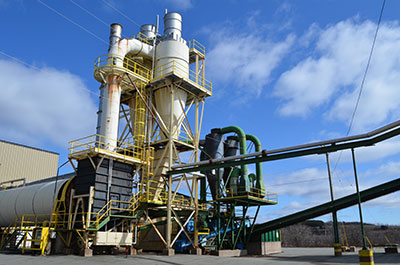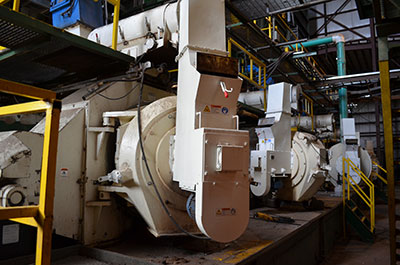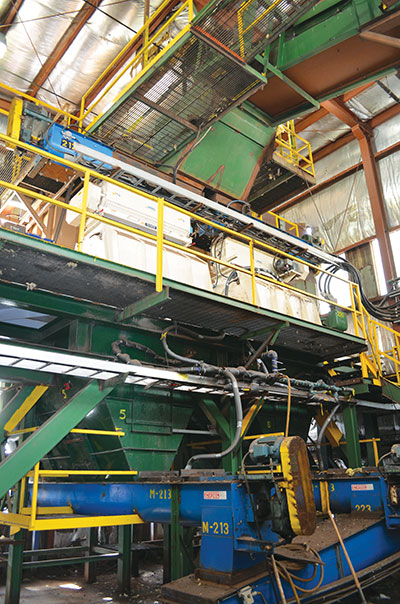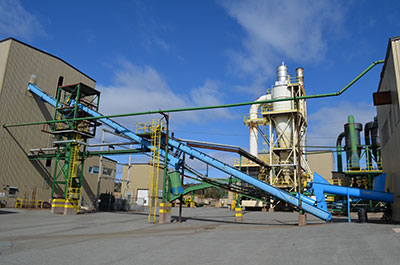
Viridis Ready to Run
June 5, 2013
By
Andrew Macklin
Nearly two years after the machines went silent and pellet production came to a halt, the Enligna pellet plant in Middle Musquodoboit, Nova Scotia, is nearly ready to begin production once again.
Nearly two years after the machines went silent and pellet production came to a halt, the Enligna pellet plant in Middle Musquodoboit, Nova Scotia, is nearly ready to begin production once again.
 |
|
| The drying system at the former Enligna site remains completely intact, with all machinery ready to run once Viridis restarts the operation.
|
Originally the home of the MacTara lumber mill, the pellet facility was added to the property as a way to make use of the bark and sawdust that remained from the operations at the two sawmills. But MacTara soon became a victim of the downturn in lumber demand in the mid-2000s, eventually filing for bankruptcy in 2007.
When Enligna (of Germany) purchased the MacTara site a short time later, the company focused on the production of pellets, choosing to leave the sawmill silent. That meant finding a new fibre supply, something they were able to do from a variety of sources, including logging contractors, private landowners, and the still-surviving sawmills in the area. There was also a nominal amount obtained through a small Crown licence acquired in late 2008.
Unfortunately, Enligna was unable to find the market share necessary to keep production going at the plant. In August 2011, just three years after Enligna had purchased the site, the doors closed on the pellet facility once again. That closure sent the plant into receivership, with $2.7 million in government loans outstanding.
Enter Viridis Energy, owner of one pellet production facility in Canada, the Okanagan Pellet Company plant in Kelowna, B.C., which produces 60,000 tons of pellets per year. At the time of the Enligna closure, the company was focusing on plans for a second facility in B.C. Instead, Viridis began looking at the possibility of acquiring the Enligna operation despite the company’s focus on operating in Western Canada.
“Our CEO, Christopher Robertson, who is based in B.C., was adamant that we continue our western expansion where the fibre sources are well known, well established and plentiful,” said Michele Rebiere, chief financial officer for Viridis Energy. “However, after a tour of the plant (Enligna) and a month or more of due diligence, Christopher was very eager to bid on the plant. We were delighted to find ourselves the successful bidder a couple of months later.”
With the purchase of the plant in Middle Musquodoboit, Viridis found itself with new opportunities to expand its brand. The management started by naming the pellet operation the Scotia Atlantic Biomass Company to provide the plant with a distinct new identity.
And while the move to purchase an existing plant in Eastern Canada wasn’t originally on the company’s radar, there are new opportunities for expanding Viridis’s stake in the Canadian pellet market that were also of great appeal when considering the purchase.
“The real motivation was the size of the plant and its proximity to Europe,” said Rebiere. “Scotia Atlantic Biomass Company is capable of producing 120,000 tons per year, which makes it one of the largest plants in Eastern Canada. Equally important is that our production will ship from the Port of Halifax, which is one of the best equipped ports for storage and loading facilities in the east.”
Getting Equipment in Place
The former Enligna facility looks relatively the same as it did back in August of 2011. While the exterior shows the typical wear of being two years older than the last time it was operational, much looks the same. Much of the equipment still sits in the same place where it was when the doors were closed.
 |
|
| Five 400-horsepower Andritz pellet mills remain in place, and will require minimal maintenance before being fired up after being idle for almost two years.
|
The 70-million-BTU GTS Energy biomass furnace and high-pressure boiler remains in place to dry the pellet material. The fibre fed for pellet production will pass through the Jeffrey 66WB green hog to reduce the fibre size before being conveyed into the MEC triple-pass dryer. The Oliver destoner removes the knots and rocks, and the Bunting Magnetics system removes any metallic particles, before passing the fibre into the 500-horsepower Andritz Sprout-Matador hammermills to be pulverized.
The Andritz pellet mill system remains in place, complete with five 400-horsepower mills connected into the operation. The system is monitored by a GreCon spark detection system, which is in place and fully functional from the previous ownership.
Little of the mobile equipment remains from Enligna, with the exception of a CBI Magnum Force 6400 mobile chipper. The chipper is in need of a new conveyor belt, but has otherwise been maintained and is ready for full operation.
“Most of the equipment is in place and in good repair,” said Rebiere. “We have done a considerable amount of preparation to ensure the plant is in a state of readiness. We have some mobile equipment to purchase, and parts of course, but in general we are well positioned for a rapid startup.”
Putting pieces in place
One of the biggest challenges facing Viridis Energy prior to restarting the Nova Scotia pellet plant is the need to hire staff. Nearly two years after Enligna went silent, many of the plant’s former employees have moved on to other sectors, and there is concern those remaining may not be interested in taking a chance on working at another pellet operation.
 |
|
| The hammermills at the Scotia Atlantic plant remain in place, with no new equipment needed in order to restart the operation.
|
Yet even with the hiring challenges facing the company, the management team at Viridis Energy is optimistic that the staff they require to create an efficient operation is available to them in the region.
“We have spoken to some former employees and we would like to bring as much expertise back to the plant as we can, while balancing that with some new ideas and new faces,” said Rebiere. “We will be hiring a number of millwrights, lead hands, and operators. Our core management team is already in place, so it will be the primary labour positions we hire. Then we will ensure that we have all the right safety training and certifications in place.”
Another challenge facing Viridis is the availability of fibre in the region. Many sawmills in Nova Scotia have shut down since the decline in the U.S. housing market.
Also, there are concerns in the province already that fibre supply will continue to decline thanks to recent moves by the Nova Scotia government to limit the amount of clear-cutting that can take place in the province. But after initial consultations and inquiries made by Viridis with companies that previously supplied the former Enligna facility, they believe that there is enough fibre available to meet their expected annual production of between 100,000 and 110,000 tons per year.
“We expect to work with the fibre providers, sawmills and wood lot managers that previously provided the plant with raw materials and any additional sources that are available,” said Rebiere. “Our long-term plan is to expand this plant and it will be highly dependent on the availability of large volumes of fibre. We will be looking for government and private wood lots to become actively involved. We believe Nova Scotia has the potential to become a very significant player in this high-growth sector.”
The road to Europe
Viridis Energy is also working hard to learn from the difficulties faced by Enligna when dealing with the European market. That includes taking a better look at sales (offtake) agreements, shipping arrangements and the currency being used to complete the transaction.
 |
|
| The exterior of the Scotia Atlantic Biomass Plant shows minimal signs of aging, other than a little rust.
|
“European offtake agreements must be carefully considered and our aim is to de-risk those contracts as much as possible,” said Rebiere. “For instance, we will only sell in Canadian dollars as to avoid the currency risk. We also intend to sell FOB Halifax, so the five- to 10-year ocean freight risk is with the customer.”
Viridis Energy is confident that the challenges remaining will be overcome in time to meet its self-imposed deadline of late June 2013. The company expects that only a short time will be needed before it gets on track to meet its production expectations. If it is able to do so, it will become just the second pellet production facility operational in Nova Scotia, and will provide the small town of Middle Musquodoboit with a renewed hope that the pellet industry can once again thrive in their community.
Print this page